Tagged / Prof. Vanora Hundley
BU Systematic Review Masterclass starting tomorrow
Looking forward to our annual Systematic Review Masterclass at Bournemouth University which will be starting tomorrow February 14th. This year for the first time we have renamed it a ‘Systematic Review to Inform Clinical Practice’ as it is not only a free-standing masterclass but also a level 7 unit of Continuing Professional Development and Training . This year we aim to provide students with the opportunity to choose an area of interest and undertake an in-depth, independent study in the form of a systematic review, focusing on a negotiated aspect of clinical practice. Prof. Vanora Hundley and I had published over twenty systematic reviews (or papers about systematic reviewing) over the past two decades. [1-21] The unit will have input from BU’s Academic Liaison Librarian, Caspian Dugdale, and BU academics such as Dr. Bibha Simkhada, Lecturer in Nursing.
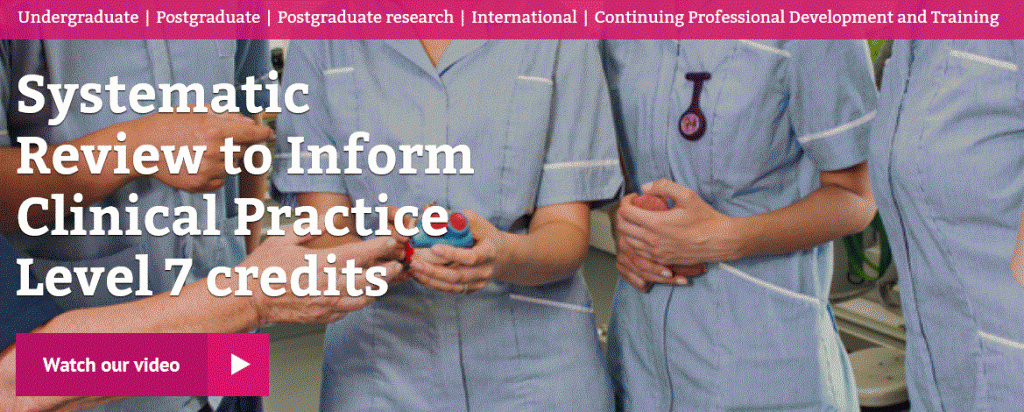
Professors Vanora Hundley and Edwin van Teijlingen
Centre for Midwifery, Maternal & Perinatal Health (CMMPH)
References:
- van Teijlingen E, Wilson, B, Barry, N, Ralph, A, McNeill, G, Graham, W, Campbell, D. (eds.) (1998) Effectiveness of interventions to promote healthy eating in pregnant women & women of childbearing age: a review, London: Health Education Authority www.nice.org.uk/nicemedia/documents/effect_eatpregant.pdf [ISBN: 0752110977].
- van Teijlingen ER, Bruce, J. (1999) Systematic reviews of health promotion initiatives: the Smokebusters experience, Health Education, 99: 76-83.
- Ryan M, Scott DA, Reeves C, Bate A., van Teijlingen E, Russell E, Napper M, Robb C (2001) Eliciting public preferences for healthcare: systematic review of techniques. Health Technology Assessment 5(5)
- Simkhada, B., van Teijlingen E., Porter, M., Simkhada, P. (2008) Factors affecting the utilisation of antenatal care in developing countries: a systematic review of the literature, Journal of Advanced Nursing 61(3): 244-260.
- Paul-Ebhohimhen, V.A., Poobalan, A., van Teijlingen E. (2008) Systematic review of effectiveness of school-based sexual health interventions in Sub-Saharan Africa, BMC Public Health, 8(4). www.biomedcentral.com/1471-2458/8/4
- Robertson L, Douglas F, Ludbrook A., Reid G., van Teijlingen E. (2008) What works with men? A systematic review of health promoting interventions targeting men, BMC Health Services Research 8(141). www.biomedcentral.com/1472-6963/8/141
- Acharya, D.R., Bhattarai, R, Poobalan, A, van Teijlingen E.R., Chapman, G. (2010) Factors associated with teenage pregnancy in South Asia: a systematic review. Health Sciences Journal 4(1): 3-14. www.hsj.gr/volume4/issue1/402.pdf
- Hundley V, Avan B, Braunholtz D, and Graham WJ (2012). Are birth kits a good idea? A systematic review of the evidence. Midwifery 28(2): 204-215
- Wasti, SP, van Teijlingen E., Simkhada, P., Randall, J., Baxter S, Kirkpatrick P, Vijay Singh Gc. (2012) Factors influencing adherence to antiretroviral treatment in Asian developing countries: a systematic review, Tropical Medicine & International Health 17(1): 71-81. http://onlinelibrary.wiley.com/doi/10.1111/j.1365-3156.2011.02888.x/pdf
- VA Hundley, BI Avan, CJ Sullivan, WJ Graham. (2013) Should oral misoprostol be used to prevent postpartum haemorrhage in home-birth settings in low-resource countries? A systematic review of the evidence. BJOG: An International Journal of Obstetrics & Gynaecology, 120:277–287DOI: 10.1111/1471-0528.12049
- van Teijlingen, ER, Simkhada, B., Ireland J., Simkhada P., Bruce J. (2012) Evidence-based health care in Nepal: The importance of systematic reviews, Nepal Journal of Epidemiology 1(4): 114-118.
- Robertson, C, Archibald, D, Avenell, A, Douglas, F., Hoddinott, P., van Teijlingen E, et al. (2014) Systematic reviews of & integrated report on quantitative, qualitative & economic evidence base for the management of obesity in men. Health Technology Assessment 18(35): 1-424. http://www.journalslibrary.nihr.ac.uk/__data/assets/pdf_file/0019/118180/FullReport-hta18350.pdf
- Stewart, F, Fraser, C, Robertson, C, Avenell, A, Archibald, D, Douglas, F, Hoddinott, P, van Teijlingen, E, Boyers, D. (2014) Are men difficult to find? Identifying male-specific studies in MEDLINE & Embase, Systematics Reviews 3,78
- Gyawali, B., Neupane, D., Sharma, R., Mishra, S.R., van Teijlingen, E., Kallestrup, P. (2015) Prevalence of type 2 diabetes in Nepal: Systematic review & meta-analysis from 2000 to 2014 Global Health Action 8: 29088 www.globalhealthaction.net/index.php/gha/article/view/29088/pdf_189
- Boyers, D, Stewart, F, Fraser, C, Robertson, C, Avenell, A, Archibald, D, Douglas, F, Hoddinott P, van Teijlingen E. (2015). A systematic review of the cost-effectiveness of non-surgical obesity interventions in men, Obesity Research & Clinical Practice 9(4), 310-327.
- Robertson, C, Avenell, A, Boachie, C., Stewart, F., Archibald D., Hoddinott, P, Douglas, F, van Teijlingen E, Boyers D. (2016) Should weight loss and maintenance programmes be designed differently for men? Systematic review of long-term RCTs presenting data for men & women: The ROMEO Project, Obesity Research & Clinical Practice 10: 70-84.
- Simkhada, P.P., Sharma, A., van Teijlingen, ER., Beanland, R,L. (2016) Factors influencing sexual behaviour between tourists and tourism employees: A systematic review. Nepal Journal of Epidemiology 6(1): 530-538. www.nepjol.info/index.php/NJE/article/view/14735/11952
- Symon, A., Pringle, J., Cheyne, H., Downe, S., Hundley, V., Lee, E., Lynn, F., McFadden, A., McNeill, J., Renfrew, M., Ross-Davie, M., van Teijlingen, E., Whitford, H, Alderdice, F. (2016) Midwifery-led antenatal care models: Mapping a systematic review to an evidence-based quality framework to identify key components & characteristics of care, BMC Pregnancy & Childbirth 16: 168 http://rdcu.be/uifu
- Hanley GE, Munro S, Greyson D, Gross MM, Hundley V, Spiby H and Janssen PA (2016) Diagnosing onset of labor: A systematic review of definitions in the research literature. BMC Pregnancy and Childbirth 16: 71 http://bmcpregnancychildbirth.biomedcentral.com/articles/10.1186/s12884-016-0857-4
- Robertson, C., Avenell, A., Stewart, F., Archibald, D., Douglas, F., Hoddinott, P., van Teijlingen, E., Boyers, D. (2017) Clinical effectiveness of weight loss & weight maintenance interventions for men: a systematic review of men-only randomised controlled trials (ROMEO Project), American Journal of Men’s Health 11(4): 1096-1123.
- Symon, A., Pringle, J., Downe, S., Hundley, V., Lee, E., Lynn, F., McFadden, A., McNeill, J., Renfrew, M., Ross-Davie, M., van Teijlingen, E., Whitford, H., Alderdice, F. (2017) Antenatal care trial interventions: a systematic scoping review and taxonomy development of care models BMC Pregnancy & Childbirth 17:8 http://bmcpregnancychildbirth.biomedcentral.com/articles/10.1186/s12884-016-1186-3
- Pitchforth, E, Nolte, E, Corbett, J, Miani, C, Winpenny, E, van Teijlingen E, et al. (2017) Community hospitals and their services in the NHS: identifying transferable learning from international developments – scoping review, systematic review, country reports and case studies Health Services & Delivery Research 5(19): 1-248.
- Ochillo, M., van Teijlingen, E., Hind, M. (2017) Influence of faith-based organisations on HIV prevention strategies in Africa: a systematic review. African Health Sciences 17(3): 753-761.
- Mahato, P., van Teijlingen, E., Simkhada, P., Angell, C. (2017) Determinants of quality of care & access to Basic Emergency Obstetric & Neonatal Care facilities & midwife-led facilities in low & middle-income countries: A Systematic Review, Journal of Asian Midwives 4(2):25-51. https://ecommons.aku.edu/jam/vol4/iss2/4/
- Simkhada, P., van Teijlingen, E., Sharma, A., Bissell, P., Poobalan, A., Wasti, S.P. (2018) Health consequences of sex trafficking: A systematic review, Journal of Manmohan Memorial Institute of Health Sciences, 4(1): 130-149.
Beautiful Work Challenge: Podcast on Birth
 A few months ago Dr. Ann Luce (Faculty of Media & Communication) and I were interviewed by the US-based organisation Catalysta TM on the issue of the portrayal of childbirth in the media. This week Catalysta released the podcast which is available here!
A few months ago Dr. Ann Luce (Faculty of Media & Communication) and I were interviewed by the US-based organisation Catalysta TM on the issue of the portrayal of childbirth in the media. This week Catalysta released the podcast which is available here! 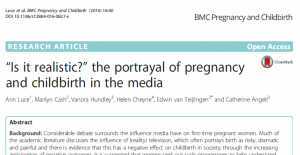
The online interviews with a journalist and podcast producer in the USA was based on our publications around the topic, such as our highly cited BMC Pregnancy& Childbirth paper ‘“Is it realistic?” the portrayal of pregnancy and childbirth in the media ‘ [1] and our 2017 book Midwifery, Childbirth and the Media published by Palgrave Macmillan [2], as well as papers in UK midwifery journals [3-4].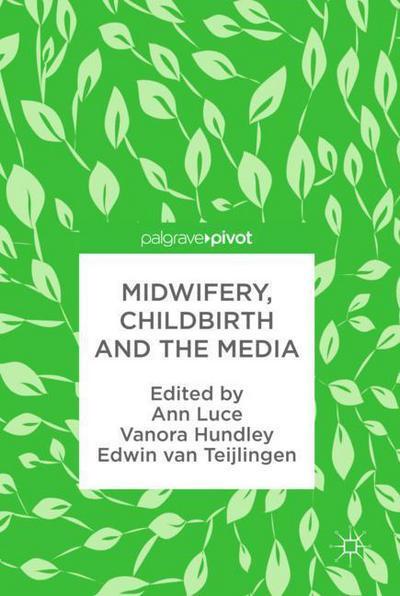
Prof. Edwin van Teijlingen
CMMPH
References
- Luce, A., Cash, M., Hundley, V., Cheyne, H., van Teijlingen, E., Angell, C. (2016) “Is it realistic?” the portrayal of pregnancy and childbirth in the media, BMC Pregnancy & Childbirth 16: 40
- Luce, A., Hundley, V., van Teijlingen, E. (Eds.) (2017) Midwifery, Childbirth and the Media, London: Palgrave Macmillan [ISBN: 978-3-319-63512-5].
- Hundley, V., Duff, E., Dewberry, J., Luce, A., van Teijlingen, E. (2014) Fear in childbirth: are the media responsible? MIDIRS Midwifery Digest 24(4): 444-447.
- Hundley, V., Luce, A., van Teijlingen, E. (2015) Do midwives need to be more media savvy? MIDIRS Midwifery Digest 25(1):5-10
First publication of 2019
 Having had the pleasure of announcing the last BU publication yesterday, today we received an email that our paper ‘Design errors in vital sign charts used in consultant-led maternity units in the United Kingdom’ has been accepted by the International Journal of Obstetric Anesthesia. This paper is led by FHSS Visiting Faculty Gary Smith and Richard Isaac and has as co-authors Vanora Hundley, Lisa Gale-Andrews and Edwin van Teijlingen as well as two further BU Visiting Professors: Mike Wee and Debra Bick.
Having had the pleasure of announcing the last BU publication yesterday, today we received an email that our paper ‘Design errors in vital sign charts used in consultant-led maternity units in the United Kingdom’ has been accepted by the International Journal of Obstetric Anesthesia. This paper is led by FHSS Visiting Faculty Gary Smith and Richard Isaac and has as co-authors Vanora Hundley, Lisa Gale-Andrews and Edwin van Teijlingen as well as two further BU Visiting Professors: Mike Wee and Debra Bick.
Nepal paper by Lesley Milne (CMMPH)
Congratulations to Lesley Milne, senior lecturer in midwifery, on the acceptance of her latest paper on maternity care in Nepal. This new paper ‘Gender inequali ties and childbearing: A qualitative study of two maternity units in Nepal’ will appear soon in the Open Access publication: Journal of Asian Midwives [1]. This is the second publication from a qualitative research study undertaken in two birthing facilities in Kathmandu Valley to examine barriers to women accessing these services from the perspective of hospital staff [2].
ties and childbearing: A qualitative study of two maternity units in Nepal’ will appear soon in the Open Access publication: Journal of Asian Midwives [1]. This is the second publication from a qualitative research study undertaken in two birthing facilities in Kathmandu Valley to examine barriers to women accessing these services from the perspective of hospital staff [2].
The study received financial support from Wellbeing of Women and the RCM (Royal College of Midwives) as Lesley won their first International Fellowship Award. The study was a collaboration led by Lesley in the Centre for Midwifery, Maternal & Perinatal Health (CMMPH) with two of FHSS’s Visiting Faculty, namely Prof. Padam Simkhada who is based at Liverpool John Moores University and Jillian Ireland, Professional Midwifery Advocate based at Poole NHS Hospitals Foundation Trust.

Well done!
Profs. Vanora Hundley & Edwin van Teijlingen
References
- Milne, L., Ireland, J., van Teijlingen, E., Hundley, V., Simkhada, P.P. (2018) Gender inequalities and childbearing: A qualitative study of two maternity units in Nepal, Journal of Asian Midwives (accepted).
- Milne, L., van Teijlingen, E., Hundley, V., Simkhada, P., Ireland, J. (2015) Staff perspectives of barriers to women accessing birthing services in Nepal: A qualitative study BMC Pregnancy & Childbirth 15:142 www.biomedcentral.com/1471-2393/15/142 .
New BU publication disability & pregnancy
Two days ago the Open Access journal BMC Pregnancy & Childbirth published an important article on women with disabilities and their experiences with the maternity services when pregnant [1]. The new paper ‘Dignity and respect during pregnancy and childbirth: a survey of the experience of disabled women’ has been co-authored by BU’s Dr. Jenny Hall (Centre for Excellence in Learning/CEL) and Prof. Vanora Hundley (Centre for Midwifery, Maternal & Perinatal Health/CMMPH) in collaboration with Dr. Bethan Collins (formerly of BU and now based at the University of Liverpool) and BU Visiting Faculty Jillian Ireland (Poole NHS Foundation Trust). The project was partially funded by the charity Birthrights and Bournemouth University.
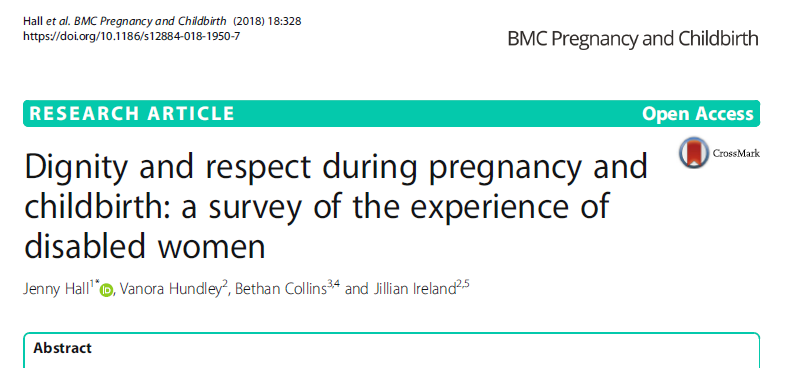 Women’s experiences of dignity and respect in childbirth revealed that a significant proportion of women felt their rights were poorly respected and that they were treated less favourably because of their disability. The authors argue that this suggests that there is a need to look more closely at individualised care. It was also evident that more consideration is required to improve attitudes of maternity care providers to disability and services need to adapt to provide reasonable adjustments to accommodate disability, including improving continuity of carer.
Women’s experiences of dignity and respect in childbirth revealed that a significant proportion of women felt their rights were poorly respected and that they were treated less favourably because of their disability. The authors argue that this suggests that there is a need to look more closely at individualised care. It was also evident that more consideration is required to improve attitudes of maternity care providers to disability and services need to adapt to provide reasonable adjustments to accommodate disability, including improving continuity of carer.
Congratulations!
Prof. Edwin van Teijlingen
Centre for Midwifery, Maternal & Perinatal Health
Reference:
- Jenny Hall, Vanora Hundley, Bethan Collins & Jillian Ireland (2018) Dignity and respect during pregnancy and childbirth: a survey of the experience of disabled women, BMC Pregnancy & Childbirth, 18:328
Midwifery education article by Prof. Hundley
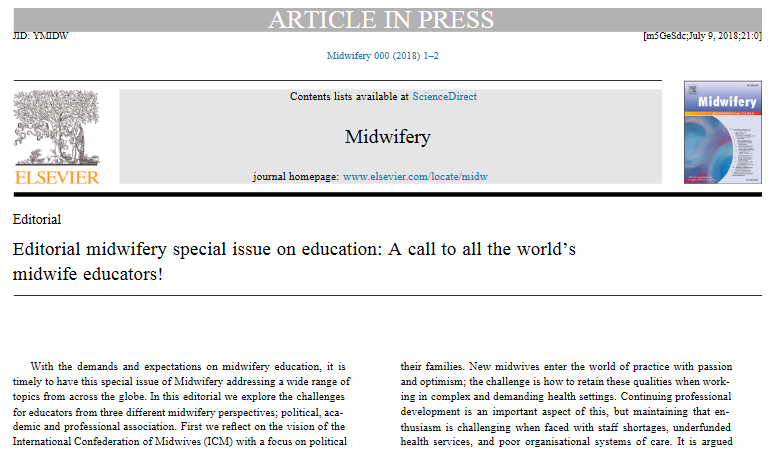 Congratulations to Prof. Vanora Hundley of FHSS on the publication of her ‘Editorial midwifery special issue on education: A call to all the world’s midwife educators!’ in Midwifery (Elsevier). This editorial is co-authored by midwives Franka Cadée of the International Confederation of Midwives (ICM) and Mervi Jokinen of European Midwives Association (EMA). The editorial was written to accompany a Special Issue of the journal focussing on midwifery education. The Midwifery Special Issue addresses a wide range of topics from across the globe. Whilst the editorial explores the challenges for midwifery educators from three different midwifery perspectives: (1) political; (2) academic ; and (3) professional association.
Congratulations to Prof. Vanora Hundley of FHSS on the publication of her ‘Editorial midwifery special issue on education: A call to all the world’s midwife educators!’ in Midwifery (Elsevier). This editorial is co-authored by midwives Franka Cadée of the International Confederation of Midwives (ICM) and Mervi Jokinen of European Midwives Association (EMA). The editorial was written to accompany a Special Issue of the journal focussing on midwifery education. The Midwifery Special Issue addresses a wide range of topics from across the globe. Whilst the editorial explores the challenges for midwifery educators from three different midwifery perspectives: (1) political; (2) academic ; and (3) professional association.
- Hundley, V., Cadée, F., Jokinen, M. (2018) Editorial midwifery special issue on education: A call to all the world’s midwife educators!, Midwifery 64: 122-123
CMMPH PhD student published in BMC Pregnancy & Childbirth
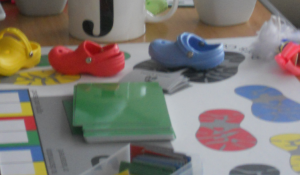 Today BMC Pregnancy & Childbirth published the latest paper by a PhD student at Bournemouth University. Our congratulations go to Alice Ladur in the Centre for Midwifery, Maternal & Perinatal Health (CMMPH), who published `Whose Shoes?’ Testing an educational board game with men of African descent living in the United Kingdom [1]. This paper is based on her PhD research and co-authored with her supervisors.
Today BMC Pregnancy & Childbirth published the latest paper by a PhD student at Bournemouth University. Our congratulations go to Alice Ladur in the Centre for Midwifery, Maternal & Perinatal Health (CMMPH), who published `Whose Shoes?’ Testing an educational board game with men of African descent living in the United Kingdom [1]. This paper is based on her PhD research and co-authored with her supervisors.
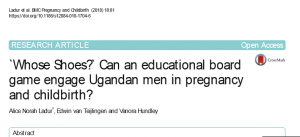 The paper addresses issues around men’s involvement in programmes or interventions aimed at the improvement of maternal health. One such innovative intervention is an educational board game which offers a unique approach to present health information where learning is reinforced through group discussions supporting peer-to-peer interactions. The authors would like to thank Gill Phillips for permission to use the Whose Shoes? board game and all participants for their participation in the PhD study.
The paper addresses issues around men’s involvement in programmes or interventions aimed at the improvement of maternal health. One such innovative intervention is an educational board game which offers a unique approach to present health information where learning is reinforced through group discussions supporting peer-to-peer interactions. The authors would like to thank Gill Phillips for permission to use the Whose Shoes? board game and all participants for their participation in the PhD study.
Alice PhD is focused on Uganda and this particular paper reports a qualitative study with men from Uganda who live in the UK on their views of an educational board game. This pilot study explored perceptions on whether a board game was relevant as a health promotional tool in maternal health prior to implementation in Uganda.

Reference:
- Ladur, A.N., van Teijlingen, E., Hundley, V. (2018) `Whose Shoes?’ Testing an educational board game with men of African descent living in the United Kingdom, BMC Pregnancy & Childbirth 18:81. http://rdcu.be/JXs0
CMMPH lecturer Daisy Wiggins’ paper published
Congratulations to Daisy Wiggins in the Centre for Midwifery, Maternal & Perinatal Health (CMMPH) on the publication of her paper ‘The effect of a birthplace decision support tool on women’s decision-making and information gathering behaviours during pregnancy: mybirthplace study protocol’. The paper is published in the Open Access journal Journal of Innovation in Health Informatics and can be accessed by clicking here! The paper is co-authored by CMMPH’s Prof. Vanora Hundley, Dr. Carol Wilkins, as well asProf. Carol Bond (University of Wolverhampton) and the Chief Executive of the Royal College of Midwives (RCM) Gill Walton.

Congratulations to all!
Prof. Edwin van Teijlingen
CMMPH
Reference:
Wiggins D, Hundley VA, Wilkins C, Bond C, Walton G. The effect of a birthplace decision support tool on women’s decision-making and information gathering behaviours during pregnancy: mybirthplace study protocol. J Innov Health Inform.2018;25(1):001–006.
Prof. Stephen Tee speaking next month at education conference in Kathmandu
Prof. Stephen Tee, Professor of Nurse Education & National Teaching Fellow, has been invited to give a key note speech at an International Conference on CHALLENGES AND PROSPECTS OF QUALITY EDUCATION IN NEPAL IN FEDERALISM ERA in Kathmandu, the capital in Nepal. 
This International Conference is organised by the Higher Institutions & Secondary Schools’ Association Nepal (HISSAN) in collaboration with 13 international universities including Bournemouth University. Members of the Conference Advisor Committee includes BU professors Vanora Hundley and Edwin van Teijlingen. Prof. Tee will be speaking about ‘What can Nepal learn from latest UK technology-enhanced teaching?’ He is in great position to speak about learning technology due to his dual role at BU as Executive Dean of the Faculty of Health & Social Sciences as well as Interim Executive Dean of the Faculty of Management, moreover with his role as Assistant Editor of Nurse Education Today.
Congratulations to Prof. Vanora Hundley on latest international paper
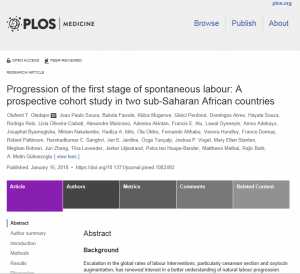 Congratulations to FHSS Prof. Vanora Hundley and her co-authors from across the globe who published ‘Progression of the first stage of spontaneous labour: A prospective cohort study in two sub-Saharan African countries’ in the journal PLOS Medicine [1].
Congratulations to FHSS Prof. Vanora Hundley and her co-authors from across the globe who published ‘Progression of the first stage of spontaneous labour: A prospective cohort study in two sub-Saharan African countries’ in the journal PLOS Medicine [1].
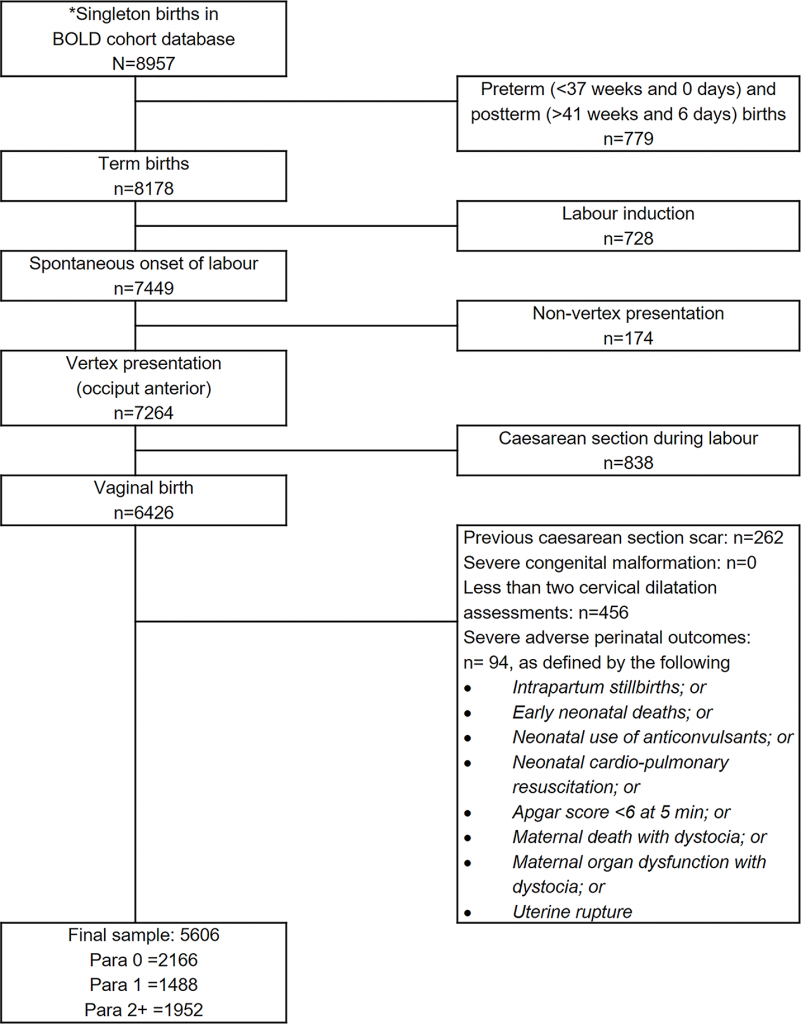 The authors highlight that since the early 2000s researchers using new statistical methods to have informed changes in recommended labour practices in some settings, they have also generated a lot of controversy. As a result of persistent questions as to whether racial characteristics influence labour progression patterns, recent studies have been conducted among different populations, but not yet in any African population. The authors conclude that
The authors highlight that since the early 2000s researchers using new statistical methods to have informed changes in recommended labour practices in some settings, they have also generated a lot of controversy. As a result of persistent questions as to whether racial characteristics influence labour progression patterns, recent studies have been conducted among different populations, but not yet in any African population. The authors conclude that
- As labour may not naturally accelerate in some women until a cervical dilatation of 5 cm is reached, labour practices to address perceived slow labour progression should not be routinely applied by clinicians until this threshold is achieved, provided the vital signs and other observations of the mother and baby are normal.
- In the absence of any problems other than a slower than expected cervical dilatation rate (i.e., 1 cm/hour) during labour, it is in the interest of the woman that expectant, supportive, and woman-centred labour care is continued.
Congratulations to all authors!
Prof. Edwin van Teijlingen
CMMPH
Reference:
Oladapo OT, Souza JP, Fawole B, Mugerwa K, Perdoná G, Alves D, Souza, H, Reis, R, Oliveira-Ciabati, L., Maiorano, A, Akintan, Alu, F.E, Oyeneyin, L, Adebayo, A, Byamugisha, J, Nakalembe, M, Idris, H.A, Okike, O, Althabe, F., Hundley, V, Donnay, F. et al. (2018) PLoS Med 15(1): e1002492. https://doi.org/10.1371/journal.pmed.1002492
Last publication of 2017?
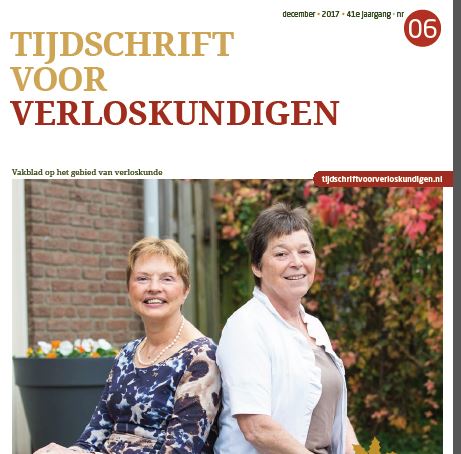 The final issue for 2017 of the Dutch Journal for Midwives, Nederlands Tijdschrift voor Verloskundigen, published our contribution on midwives and the media [1]. The two-page article ‘MEER BEMOEIEN MET MEDIA’ argues (in Dutch) that midwives as individuals and as a profession must try to engage with the media. Midwives should be open to starting a dialogue concerning issues around maternity care and midwifery. This article published in a practitioners’ journal builds on the collaborative research conducted at Bournemouth University around midwifery and the media [2-4], and our recently published edited book on the topic [5].
The final issue for 2017 of the Dutch Journal for Midwives, Nederlands Tijdschrift voor Verloskundigen, published our contribution on midwives and the media [1]. The two-page article ‘MEER BEMOEIEN MET MEDIA’ argues (in Dutch) that midwives as individuals and as a profession must try to engage with the media. Midwives should be open to starting a dialogue concerning issues around maternity care and midwifery. This article published in a practitioners’ journal builds on the collaborative research conducted at Bournemouth University around midwifery and the media [2-4], and our recently published edited book on the topic [5].

Ann Luce, Vanora Hundley & Edwin van Teijlingen
References:
- van Teijlingen, E., De Vries, R., Luce, A., Hundley, V. (2017) Meer bemoeien met media (In Dutch: more engagement with media). Tijdschrift voor Verloskundigen (in Dutch: Journal for Midwives), 41 (6):28-29.
- Luce, A., Cash, M., Hundley, V., Cheyne, H., van Teijlingen, E., Angell, C. (2016) “Is it realistic?” the portrayal of pregnancy and childbirth in the media BMC Pregnancy & Childbirth 16: 40 http://bmcpregnancychildbirth.biomedcentral.com/articles/10.1186/s12884-016-0827-x
- Hundley, V., Duff, E., Dewberry, J., Luce, A., van Teijlingen, E. (2014) Fear in childbirth: are the media responsible? MIDIRS Midwifery Digest 24(4): 444-447.
- Hundley, V., Luce, A., van Teijlingen, E. (2015) Do midwives need to be more media savvy? MIDIRS Midwifery Digest 25(1):5-10.
- Luce, A., Hundley, V., van Teijlingen, E. (Eds.) (2017) Midwifery, Childbirth and the Media, Palgrave Macmillan
CMMPH student wins The Postgraduate Research Prize
Ms. Sheetal Sharma who will be graduating from Bournemouth University with a Ph.D. on November 10th has been awarded Bournemouth University’s The Postgraduate Research Prize. This prize is for the postgraduate student whose achievement is deemed by the Vice-Chancellor to have been most outstanding in their time at BU.
Sheetal stood out as a Ph.D. student as her maternal health research project in Nepal resulted in several many publications [1-6], some in very prestigious journals such as BMC Pregnancy & Childbirth [4] and PLOSOne [5] . She won the best poster prize at the international GLOW conference in Birmingham in 2013 with the poster presentation ‘Getting women to care in Nepal: A Difference in Difference analysis of a health promotion intervention’. She won a SBSP travel scholarship to present a poster at the 8th European Congress on Tropical Medicine & International Health in 2013 in Denmark. Sheetal’s abstract of the poster was also officially published [7].
Sheetal presented at the Science in Society conference (SiS) at Berkeley University in November 2012 where she received a Graduate Scholar Award. In addition, she won a Santander travel scholarships for £5,000 to learn about research at the University of Buenos Aires, Institute for Clinical Effectiveness & Health Policy (Argentina) and at the University of Barcelona in Spain. This scholarship resulted in a great publication with the world-famous researcher in reproductive health care prof. Jose Belizan as co-author. Sheetal also presented her work at the first ever national health promotion conference in Nepal.
Sheetal also had less academic achievements as she won the BU photo competition at the 2014 PGR conference with the photo in this blog. 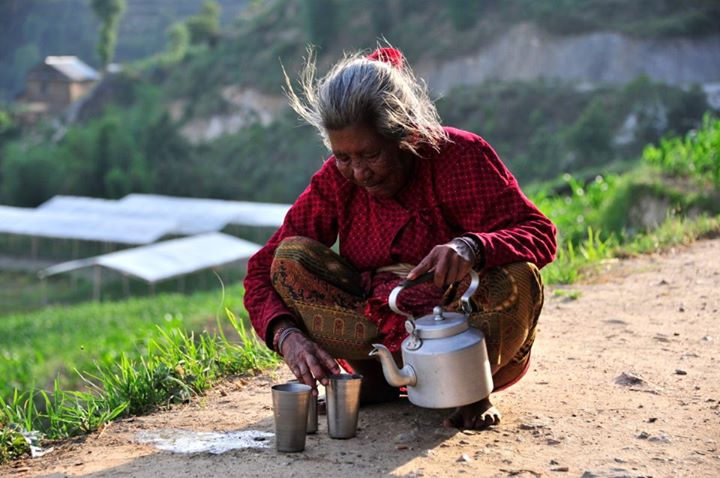
Sheetal was also actively involved as a student representative in the Faculty of Health & Social Sciences as well as in the Graduate School. She even found time to join the editorial board of the newly formed Journal of Asian Midwives.
Over the past five years Sheetal has had many mentions on this BU research blog as one of BU’s most prolific publishing PhD students.
As supervisors and co-authors we are proud of her!
Dr. Catherine Angell, Prof. Vanora Hundley & Prof. Edwin van Teijlingen (CMMPH)
BU Visiting Professor Padam Simkhada, Liverpool John Moores University
Dr. Elisa Sicuri, Assistant Research Professor at ISGlobal, Spain
Prof. Jose Belizan, University of Buenos Aires, Argentina
References to published work by Sheetal Sharma:
- Joshi, R., Sharma, S., van Teijlingen, E. (2013) Improving neonatal health in Nepal: Major challenges to achieving Millennium Development Goal 4, Health Science Journal 7(3): 247-257. http://www.hsj.gr/index.files/Page1421.htm
- Sharma, S., Joshi, P., van Teijlingen, E. (2015) ‘Nepenglish’ or ‘Nepali English’: A new version of English? Asian Journal of Humanities & Social Sciences 4(2): 188-193. www.ajssh.leena-luna.co.jp/AJSSHPDFs/Vol.4%282%29/AJSSH2015%284.2-21%29.pdf
- Simkhada, B., Sharma, S., van Teijlingen, E., Silwal, RC, Simkhada, P. (2015) Exploring Maternal Mortality Reduction. In: Wasti, SP, Simkhada, PP, van Teijlingen, E. (Eds.) The Dynamics of Health in Nepal, Kathmandu: Social Science Baha & Himal Books: 95-121.
- Sharma, S., van Teijlingen, E., Belizán, J.M., Hundley, V., Simkhada, P., Sicuri, E. (2016) Measuring What Works: An impact evaluation of women’s groups on maternal health uptake in rural Nepal, PLOS One 11(5): e0155144 http://journals.plos.org/plosone/article?id=10.1371%2Fjournal.pone.0155144
- Sharma, S., van Teijlingen, E., Hundley, V., Angell, C., Simkhada, P. (2016) Dirty and 40 days in the wilderness: Eliciting childbirth and postnatal cultural practices and beliefs in Nepal BMC Pregnancy & Childbirth 16: 147 https://bmcpregnancychildbirth.biomedcentral.com/articles/10.1186/s12884-016-0938-4
- Sharma, S, Simkhada, P, Hundley, V, van Teijlingen E., Stephens, J, Silwal, RC, Angell, C (2017) Evaluating a Community Maternal Health Programme: Lessons Learnt. Journal Asian Midwives 4(1):3–20.
- Sharma, S., van Teijlingen, E., Hundley, V., Stephens J., Simkhada, P., Angell, C., Sicuri, E., Belizan, J.M. (2013) Mixed-methods evaluation of a maternity care intervention in rural Nepal: measuring what works, Poster P.2.3.004 (A), Tropical Medicine & International Health 18 (Suppl. 1): 108–231.
New CMMPH midwifery publication
Congratulations to Dr. Sue Way and Prof. Vanora Hundley in BU’s Centre for Midwifery, Maternal & Perinatal Health (CMMPH) on their latest publication on the latent phase of labour. Their paper ‘Defining the latent phase of labour: is it important?’ appeared in Evidence Based Midwifery and was written with midwifery colleagues across the UK, Germany and Canada [1].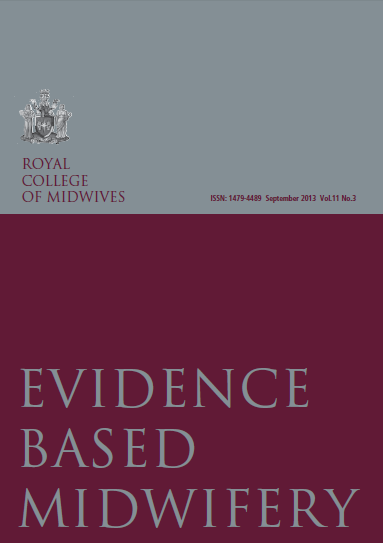
Congratulations
Prof. Edwin van Teijlingen
CMMPH
Reference:
- Hundley V, Way S, Cheyne H, Janssen P, Gross M, Spiby H (2017) Defining the latent phase of labour: is it important? Evidence Based Midwifery 15 (3): 89-94.
The Conversation about midwifery campaign
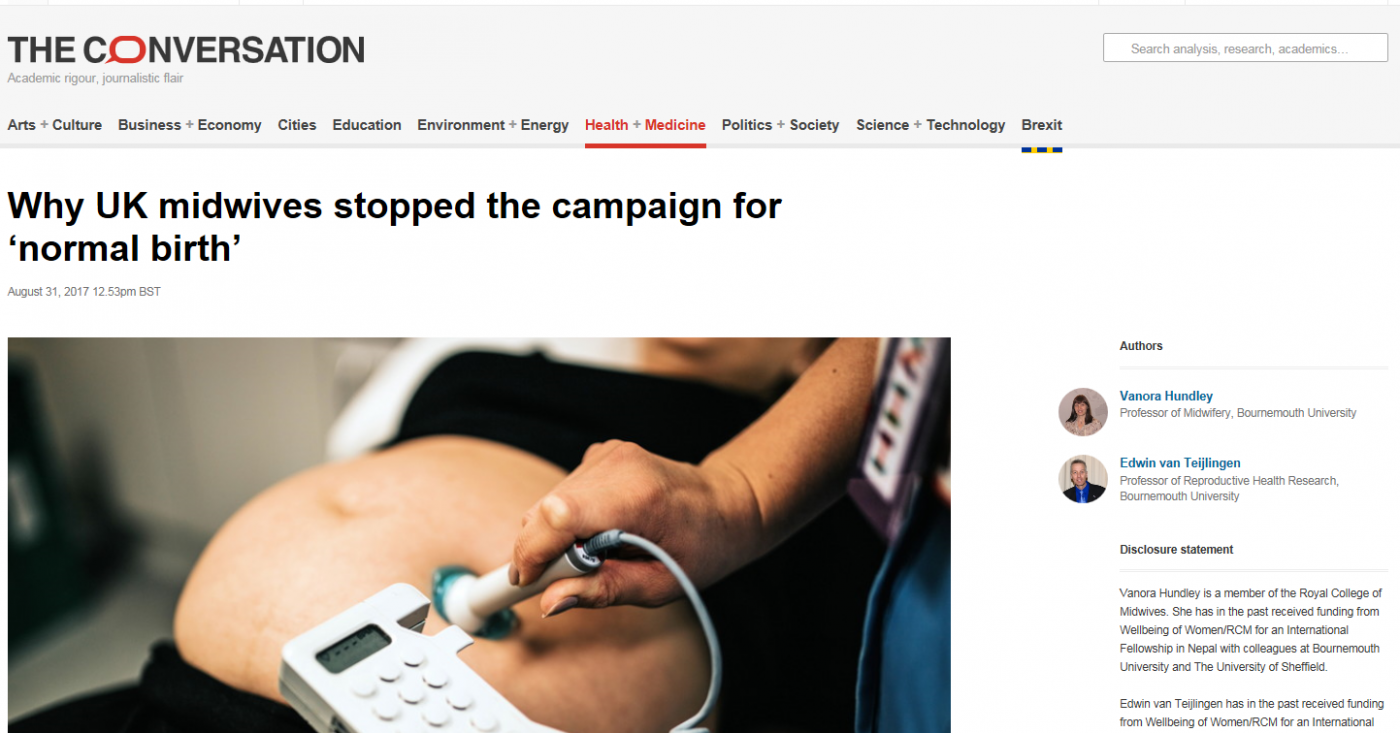
Last week saw the publication of a piece by BU Professors Vanora Hundley and Edwin van Teijlingen in The Conversation under the title: “Why UK midwives stopped the campaign for ‘normal birth’”. The editor of The Conversation invited the authors to write in reply to the statement: “According to media reports, women will no longer be told they should have an intervention-free birth and midwives will be encouraged to use terms a “physiological birth” rather than “normal birth”. We are looking for an expert to comment on this.”
The resulting article is the result of a quite long process of writing a draft, which was initially edited by The Conversation in a way the authors did not feel represented what they wanted to say. In our original submission we raised the role of the media with regard to responsible reporting, but it seems this was a step too far. In submitting a re-written version, which was edited again before it came back to the authors, we were advised that academics should not ‘blame the media’ since that avoids addressing the issue, but what if the media really does have a role? After seven or eight major alterations we reached and an agreed version that we think is a balance and fairly easy to read newspaper article. Our new book Midwifery, Childbirth and the Media due to be published by Palgrave Macmillan will cover these media issue in greater detail.
Professors Vanora Hundley & Edwin van Teijlingen
CMMPH
New publication Sheetal Sharma (PhD graduate 2017)
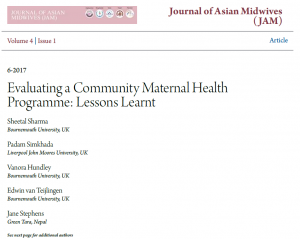 Congratulations to Sheetal Sharma whose latest article appeared in today’s new issue of Journal of Asian Midwives [1]. Sheetal wrote the paper ‘Evaluation a Community Maternal Health Programme: Lessons Learnt’ with her PhD supervisors Dr. Catherine Angell, Prof. Vanora Hundley, Prof. Edwin van Teijlingen and Prof. Padam Simkhada (Liverpool John Moores University & FHSS Visiting Professor) and the director of Green Tara Nepal Mr. Ram Chandra Silwal and the founder of Green Tara Trust, London, Dr. Jane Stephens. The Journal of Asian Midwives is an Open-Access journal hence this article is freely available across the globe.
Congratulations to Sheetal Sharma whose latest article appeared in today’s new issue of Journal of Asian Midwives [1]. Sheetal wrote the paper ‘Evaluation a Community Maternal Health Programme: Lessons Learnt’ with her PhD supervisors Dr. Catherine Angell, Prof. Vanora Hundley, Prof. Edwin van Teijlingen and Prof. Padam Simkhada (Liverpool John Moores University & FHSS Visiting Professor) and the director of Green Tara Nepal Mr. Ram Chandra Silwal and the founder of Green Tara Trust, London, Dr. Jane Stephens. The Journal of Asian Midwives is an Open-Access journal hence this article is freely available across the globe.
Reference:
Sharma, S., Simkhada, P., Hundley, V., van Teijlingen, E., Stephens, J., Silwal, R.C., Angell, C. (2017) Evaluation a Community Maternal Health Programme: Lessons Learnt. Journal of Asian Midwives. 4(1): 3–20.
Successful Breastfeeding Debate in 2017 Festival of Learning
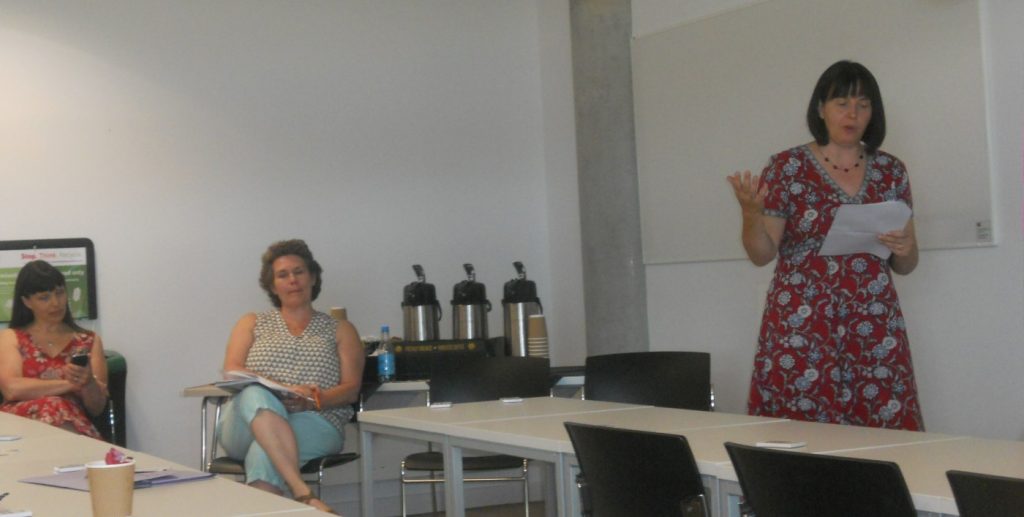 Yesterday, on the first day of BU’s Festival of Learning, we organised a debate on breastfeeding in society. The debate was structured around the motion “This house believes that: Breastfeeding is over-rated and unpopular.”
Yesterday, on the first day of BU’s Festival of Learning, we organised a debate on breastfeeding in society. The debate was structured around the motion “This house believes that: Breastfeeding is over-rated and unpopular.”
In favour of the motion argued Dr. Ann Luce from the Faculty of Media and Communication (FMC) and Prof. Edwin van Teijlingen from the Centre for Midwifery, Maternal & Perinatal Health (CMMPH) in the Faculty of Health & Social Sciences (FHSS).
Against the motion argued Dr. Catherine Angell (CMMPH) and Ms. Sue Hurst midwife and lactation advisor at St Mary’s Maternity Hospital which is part of Poole Hospital NHS Foundation Trust.
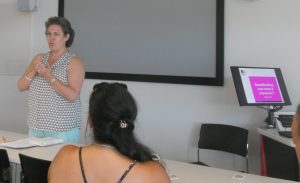 Before the debate started Prof. Vanora Hundley (CMMPH) asked the audience to vote on the motion. At this first vote the audience overwhelmingly voted against the motion (86%). After the presentations of the four debaters the audience was asked to vote again and this time the against vote had dropped to 71%. Prof. Hundley then opened up the debate to the wider audience and, after an occasionally heated debate, the audience were asked for their final vote. On this final occasion 85% voted against.
Before the debate started Prof. Vanora Hundley (CMMPH) asked the audience to vote on the motion. At this first vote the audience overwhelmingly voted against the motion (86%). After the presentations of the four debaters the audience was asked to vote again and this time the against vote had dropped to 71%. Prof. Hundley then opened up the debate to the wider audience and, after an occasionally heated debate, the audience were asked for their final vote. On this final occasion 85% voted against.
There was a general agreement that breastfeeding beneficial for both mother and baby and hence that it was not over-rated. There appeared to be sympathy for the view that breastfeeding was not popular, or at least not as popular as it should be, considering how good it is!
BU posters at international midwifery conference
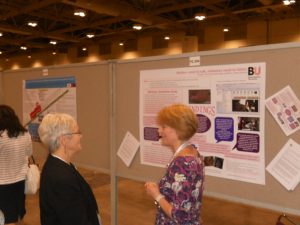 BU academics from the Faculty of Health & Social Sciences had a strong presence at the International Confederation of Midwives (ICM) in Canada this lunch time. They presented four separate academic posters today at the ICM conference in Toronto. First, Dr. Alison Taylor presented her poster ‘Mothers need to talk, midwives need to listen: Insights from breastfeeding mother’s video diaries’. Secondly, Sara Stride and Dr. Sue Way presented their poster on ‘UUPP Study: Updating the Understanding of Perineal Practice at the time of birth across the United Kingdom’.
BU academics from the Faculty of Health & Social Sciences had a strong presence at the International Confederation of Midwives (ICM) in Canada this lunch time. They presented four separate academic posters today at the ICM conference in Toronto. First, Dr. Alison Taylor presented her poster ‘Mothers need to talk, midwives need to listen: Insights from breastfeeding mother’s video diaries’. Secondly, Sara Stride and Dr. Sue Way presented their poster on ‘UUPP Study: Updating the Understanding of Perineal Practice at the time of birth across the United Kingdom’.
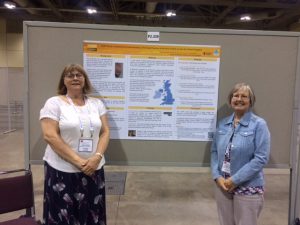 Prof. Vanora Hundley, Dr. Ann Luce (BU Faculty of Media & Communication), Prof. Edwin van Teijlingen and two students, Sofie Edlund and Sian Ridden also presented their poster on ‘Changing the narrative around birth: midwives’ views of working with the media’.
Prof. Vanora Hundley, Dr. Ann Luce (BU Faculty of Media & Communication), Prof. Edwin van Teijlingen and two students, Sofie Edlund and Sian Ridden also presented their poster on ‘Changing the narrative around birth: midwives’ views of working with the media’. 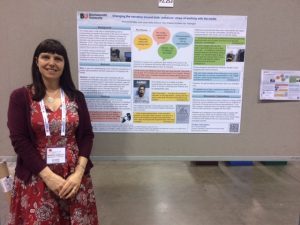
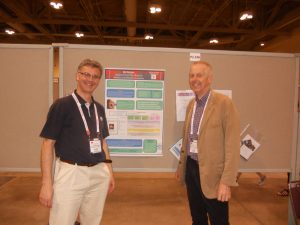 And, last but not least, Prof. Vanora Hundley and Prof. Edwin van Teijlingen also contributed to a poster produced by Dr. Andrew Symon and colleagues from across the UK: ‘Midwifery-led antenatal care models: Mapping a systematic review to an evidence-based quality framework to identify key components and characteristics of care’.
And, last but not least, Prof. Vanora Hundley and Prof. Edwin van Teijlingen also contributed to a poster produced by Dr. Andrew Symon and colleagues from across the UK: ‘Midwifery-led antenatal care models: Mapping a systematic review to an evidence-based quality framework to identify key components and characteristics of care’.












 Nursing Research REF Impact in Nepal
Nursing Research REF Impact in Nepal Fourth INRC Symposium: From Clinical Applications to Neuro-Inspired Computation
Fourth INRC Symposium: From Clinical Applications to Neuro-Inspired Computation ESRC Festival of Social Science 2025 – Reflecting back and looking ahead to 2026
ESRC Festival of Social Science 2025 – Reflecting back and looking ahead to 2026 3C Event: Research Culture, Community & Cookies – Tuesday 13 January 10-11am
3C Event: Research Culture, Community & Cookies – Tuesday 13 January 10-11am Dr. Chloe Casey on Sky News
Dr. Chloe Casey on Sky News ECR Funding Open Call: Research Culture & Community Grant – Application Deadline Friday 12 December
ECR Funding Open Call: Research Culture & Community Grant – Application Deadline Friday 12 December MSCA Postdoctoral Fellowships 2025 Call
MSCA Postdoctoral Fellowships 2025 Call ERC Advanced Grant 2025 Webinar
ERC Advanced Grant 2025 Webinar Horizon Europe Work Programme 2025 Published
Horizon Europe Work Programme 2025 Published Update on UKRO services
Update on UKRO services European research project exploring use of ‘virtual twins’ to better manage metabolic associated fatty liver disease
European research project exploring use of ‘virtual twins’ to better manage metabolic associated fatty liver disease